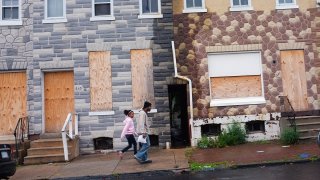
NBC10 is one of dozens of news organizations producing BROKE in Philly, a collaborative reporting project on solutions to poverty and the push toward economic justice. Follow us at @BrokeInPhilly.
Gov. Tom Wolf said Tuesday he does not have the legal authority to extend Pennsylvania’s moratorium on evictions and foreclosures beyond the end of the month, meaning that renters will no longer be shielded from losing their homes for failing to pay rent during the pandemic.
In a letter to both legislative chambers, Wolf said the state’s Emergency Services Code allowed him to block eviction proceedings for only a limited amount of time. The Democrat called on state lawmakers in the Republican-controlled General Assembly to pass legislation to extend the statewide moratorium, which has been in place for more than five months.
"Upon the expiration of the moratorium at the end of the month, notices of eviction and foreclosure will again be able to be sent,” Wolf wrote. “This begins a process that takes time, but that ultimately concludes with our fellow Pennsylvanians being removed from their homes.”
Get Philly local news, weather forecasts, sports and entertainment stories to your inbox. Sign up for NBC Philadelphia newsletters.
Senate Majority Leader Jake Corman, R-Centre, said Republicans are open to discussions about a legislative fix, but criticized Wolf for “ruling by executive order” and waiting until the moratorium was nearly expired before approaching lawmakers.
Wolf's letter “is the first we heard of the need for emergency legislative action to bail out the governor from his previous decisions,” Corman said in a written statement. “We are trying to figure out how, on one hand, the governor says he has the authority to limit the number of patrons in a restaurant but, on the other hand — all of a sudden — he no longer has the authority to continue his eviction moratorium policy.”
Pennsylvania is using $175 million of its federal coronavirus relief money to provide rental assistance to eligible tenants and mortgage relief to homeowners, but Wolf said the program has not been working as intended. Landlords have been reluctant to participate in the state program, he said, because of a $750-per-month cap on payments. Wolf said lawmakers should raise the cap and relax other requirements in the program to encourage participation.
“The expiration of the moratorium would be less significant if the programs established to assist renters and homeowners ... were functioning as intended to provide payment assistance,” Wolf wrote.
Thousands of landlords and renters applied for assistance through Aug. 14, and $465,000 was distributed to nearly 1,100 of those applicants, according to the Pennsylvania Housing Finance Agency, which is administering the program.
Like many Democratic and Republican governors and local officials around the U.S., Wolf imposed a moratorium on foreclosures and evictions to prevent people from losing their homes in the midst of the virus outbreak and widespread joblessness. On July 9, he extended the statewide moratorium until Aug. 31, saying renters needed more breathing room. A landlords group and individual landlords tried to get the moratorium overturned, but the state Supreme Court dismissed their suit.
Now, housing advocates predict a rush to the courthouse and a wave of evictions once the moratorium expires.
“We've been getting phone calls already with landlords sending their tenants notices that they’re behind on their rent, and they need to collect their rent and they're planning on filing for eviction sometime soon,” said Vik Patel, a housing attorney at Community Legal Services of Philadelphia.
Landlords say they need to be able to enforce lease agreements, pointing out they're still on the hook for loan payments, taxes, insurance, utilities, maintenance and other expenses.
Wolf’s unilateral eviction moratorium burdened landlords who “now cannot afford to pay their bills, including property taxes that go to fund local schools," said House GOP spokesperson Jason Gottesman.
House members will discuss the issue when they return to session next week, he said.

